Data centers constantly face the risk of power interruptions. An outage can cause chaos, data loss, and huge financial damage. So, how do they stay always on?
Yes, UPS systems are absolutely critical. They provide instant battery backup during outages and filter power. This prevents data loss, hardware damage, and costly service interruptions for any data center.
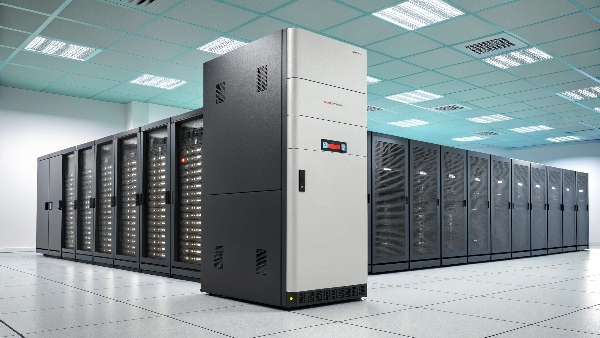
Transition Paragraph:
At Daopulse, with our solid decade of experience as an OEM/ODM manufacturer of uninterruptible power supplies, I have seen firsthand just how vital these systems are. My core insight is that the role of uninterruptible power supplies in data centers is critically important and represents a significant investment. They are not just an afterthought; they are a foundational component that directly impacts operational reliability and the bottom line. For clients like Mr. Li, a Procurement Manager at a Hospital Infrastructure Company, or the many System Integrators we partner with, choosing the right UPS is a decision with far-reaching consequences. They need solutions that are not only effective but also certified and backed by a reliable partner.
Why are UPS systems critical for data center operations?
Modern businesses depend completely on their data centers being online all the time. Even a small flicker in power can stop everything, corrupt vital data, and badly damage a company's reputation. What makes UPS so essential?
UPS systems are critical because they guarantee uninterrupted power. This prevents catastrophic data loss, hardware failure, and operational downtime that can cripple a data center and its clients.
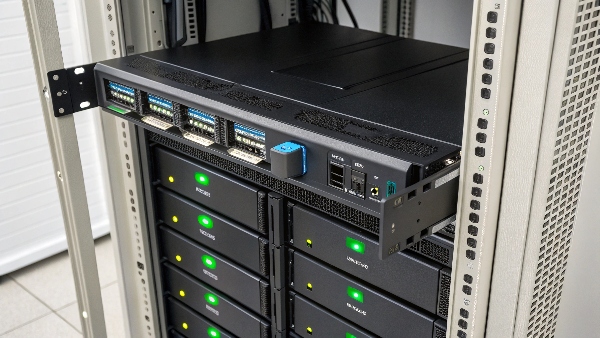
Dive deeper Paragraph:
The criticality of UPS systems in data center operations cannot be overstated. Think about the consequences of downtime. For many businesses, every minute a data center is offline translates directly into lost revenue. Financial transactions halt. E-commerce sites become unavailable. Cloud services stop. Beyond the immediate financial hit, there is the potential for severe reputational damage. If customers cannot access services or, worse, if their data is compromised due to a power event, their trust can be permanently broken. This is a risk that no modern enterprise can afford to take.
Here is how UPS systems directly address these critical needs:
Protecting Against Power Outages
The most obvious role of a UPS is to provide immediate backup power when the main utility supply fails. This seamless transition to battery power gives critical systems enough time for a graceful shutdown or for backup generators to start and take over the load. Without this bridge, an abrupt power loss would crash servers and storage systems, almost certainly leading to data corruption or loss.
Safeguarding Sensitive Equipment
Modern IT equipment is incredibly sensitive to power fluctuations. Sags, surges, spikes, and electrical noise can all damage delicate components over time or cause instant failure. A UPS, particularly an online double-conversion type which we specialize in at Daopulse, continuously conditions the incoming power, shielding valuable hardware from these harmful irregularities. This extends equipment lifespan and improves overall system stability.
Ensuring Business Continuity
Ultimately, UPS systems are about ensuring business continuity. They are a cornerstone of any disaster recovery and business continuity plan. For organizations like hospitals, as our client Mr. Li knows, continuous operation is a matter of life and death. For financial institutions, it is a matter of market stability and regulatory compliance. The investment in a robust UPS solution, whether our reliable lead-acid or advanced lithium battery systems, is an investment in the organization's ability to operate without interruption. This "critically important" nature of UPS, as per my insight, means the cost is justified by the immense value it protects. Our CE, RoHS, and ISO certifications provide further assurance of the quality and reliability needed for such critical roles.
What is the function of UPS in data center?
Raw utility power from the grid is often unstable. It can be full of dips, spikes, and other fluctuations. These power problems can silently degrade or even instantly destroy sensitive IT gear. So, what exactly does a UPS do?
A UPS in a data center has two main functions: providing emergency battery backup during outages and continuously conditioning incoming power to protect sensitive IT equipment from damaging irregularities.
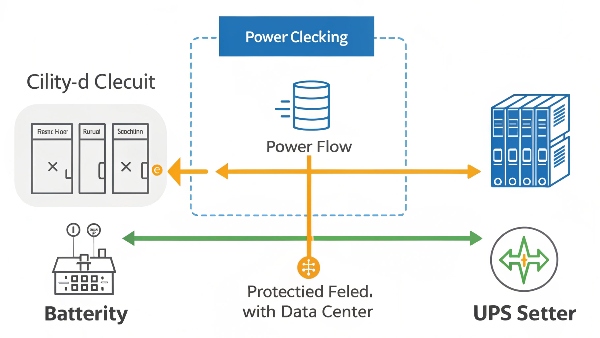
Dive deeper Paragraph:
The function of a UPS in a data center is twofold, and both aspects are essential for maintaining smooth and reliable operations.
First, and most commonly understood, is its role in providing backup power. When the primary power source fails – a blackout – the UPS instantly switches to its internal batteries. This ensures that the connected IT equipment, like servers, storage arrays, and network switches, continues to run without interruption. The duration it can supply this battery power, known as runtime, depends on the battery capacity and the load. This runtime is crucial; it might be for a few minutes to allow for a safe, orderly shutdown of systems, or it could be longer, to bridge the gap until standby generators come online.
Second, and equally important, is power conditioning1. Utility power is rarely perfect. It can suffer from various disturbances. An Online Double-Conversion UPS, which is the preferred type for most data centers, constantly processes the incoming power. It converts the AC input to DC to charge the batteries and power an inverter, and then the inverter regenerates a completely new, clean, and stable AC output for the IT load. This process isolates the equipment from:
- Voltage Sags (Brownouts): Periods of low voltage.
- Voltage Surges/Spikes: Short bursts of high voltage.
- Electrical Noise (EMI/RFI): Electromagnetic or radio frequency interference.
- Frequency Variations: Deviations from the standard 50Hz or 60Hz.
Line-Interactive UPS systems also offer power conditioning, primarily through an Automatic Voltage Regulator (AVR)2 that corrects sags and swells without resorting to battery power for minor fluctuations.
My insight about UPS systems being a "critically important and significant investment" is strongly supported by this power conditioning function. It is not just about surviving blackouts. The constant protection against everyday power anomalies extends the lifespan of expensive IT hardware, reduces mysterious glitches, and improves overall system reliability. For System Integrators, ensuring this level of power quality for their clients' deployments is a key value proposition. At Daopulse, whether clients choose our cost-effective lead-acid UPS or our high-efficiency lithium battery UPS, they receive systems designed to excel at both these critical functions.
| Power Problem | How UPS Addresses It |
|---|---|
| Blackout (Outage) | Switches to battery power instantly. |
| Sag (Brownout) | Boosts voltage (Line-Interactive/Online). |
| Surge (Spike) | Clamps or absorbs excess voltage. |
| Noise (EMI/RFI) | Filters out interference (especially Online UPS). |
| Frequency Variation | Regenerates stable output frequency (Online UPS only). |
What is the main problem of UPS?
Even the protectors need protection and regular care. UPS systems are not "set and forget" devices. If they are neglected, they can fail when they are needed most. This completely negates their entire purpose. So, what is their Achilles' heel?
The main problem with UPS systems is battery failure. Batteries are consumable components with a finite lifespan. They require regular testing, maintenance, and timely replacement to ensure UPS reliability.
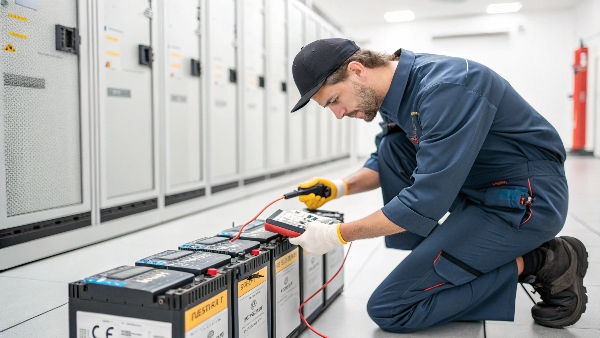
Dive deeper Paragraph:
While UPS systems are designed for reliability, they are not infallible. Their most common point of failure, and thus what I consider their "main problem," overwhelmingly revolves around their batteries. Batteries are electrochemical devices; they degrade over time, whether they are used frequently or not.
Battery Management and Lifespan
Lead-acid batteries, the traditional choice, typically have a design life of 3-5 years, though this can be affected by ambient temperature, the number of discharge cycles, and charging quality. Lithium-ion batteries, which Daopulse offers with patented technology, generally boast a longer lifespan, often 8-10 years or more, and can tolerate higher temperatures better. However, all batteries eventually wear out and lose their capacity to hold a charge. If not identified and replaced in time, a UPS with failed batteries will offer no protection during an outage. This is why my insight about UPS systems being a "significant investment" also extends to their upkeep. Protecting this initial investment through diligent battery management is crucial.
Component Failure
Beyond batteries, other components can occasionally fail. Fans, which are necessary for cooling, have moving parts and can wear out. Capacitors, which are vital for power conditioning, also have a finite lifespan, though usually longer than batteries. Regular inspection can help identify these issues before they cause a system failure.
Overloading
A UPS is rated for a certain maximum load. If a data center expands its IT equipment without upgrading its UPS capacity, the UPS can become overloaded. An overloaded UPS may not be able to support the load during an outage, or it might shut down to protect itself.
Lack of Regular Maintenance and Testing
Many UPS problems can be prevented or caught early with a proper maintenance schedule. This includes regular visual inspections, battery testing (checking voltage, internal resistance, and performing discharge tests where appropriate), and ensuring the environment (temperature, humidity) is within specified limits. At Daopulse, we always stress the importance of proactive maintenance to our clients. We incorporate advanced battery monitoring features, especially in our lithium UPS solutions, to provide early warnings and help simplify this process. Our dedicated team often assists clients in establishing effective maintenance protocols to ensure their critical power protection remains dependable.
What is the biggest problem for data centers?
Data centers have to juggle many serious threats. These range from sophisticated cyberattacks to critical cooling system failures. But there is one fundamental issue that can bring everything grinding to a halt almost instantly. What is it?
The biggest problem for data centers is often power failure or instability. While many challenges exist, an unreliable power supply fundamentally undermines all operations, leading to immediate and widespread disruption.
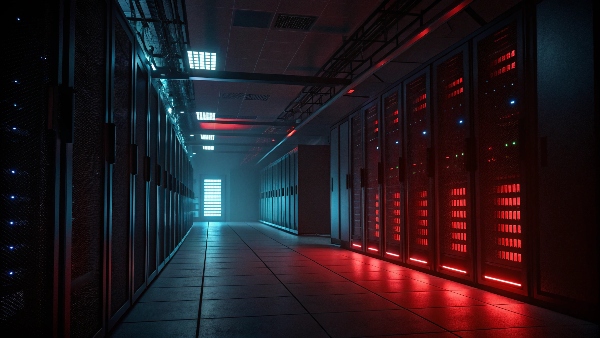
Dive deeper Paragraph:
Data centers face a multitude of significant challenges. Cybersecurity threats are ever-present and constantly evolving. Maintaining optimal cooling is a complex and energy-intensive task; overheating can quickly lead to equipment failure. Ensuring robust network connectivity is paramount for data transmission. Managing operational costs, including massive energy consumption, is a continuous balancing act. Scaling infrastructure to meet growing demand requires careful planning and significant investment.
However, despite all these critical concerns, I believe the single biggest, most foundational problem for any data center is power.
Why power? Because without a stable, continuous supply of high-quality electricity, nothing else matters. The most advanced cybersecurity measures are useless if the servers they protect are offline. The most efficient cooling systems cannot function without power. High-speed network links go dead. All operations cease. A power outage is an immediate, show-stopping event. Even intermittent power quality issues, like sags or surges, can cause system crashes, data corruption, and cumulative hardware damage over time.
This is precisely why UPS systems are so integral to data center design and operation. They are the first line of defense against this biggest problem. The "critically important and significant investment" aspect of UPS, as highlighted by my insight, is entirely justified because it directly mitigates the most fundamental threat to a data center's existence. Procurement Managers, like Mr. Li, understand this deeply. When they select UPS suppliers, they are looking for proven reliability, robust technology, and comprehensive support. That is why Daopulse emphasizes our adherence to CE, RoHS, and ISO certifications, and our ability to deliver customized solutions, whether it is specific voltages, capacities, or a choice between dependable lead-acid and our advanced, patented lithium battery UPS systems. We work with clients to plan for adequate power capacity and appropriate levels of redundancy (e.g., N+1, 2N) to ensure their power infrastructure is as resilient as possible. Addressing the power problem effectively is the bedrock upon which all other data center successes are built.
Conclusion
UPS systems are truly indispensable for data centers. They are the critical foundation for ensuring reliability and uptime. Their vital role guarantees business continuity and protects our increasingly digital world against power issues.

